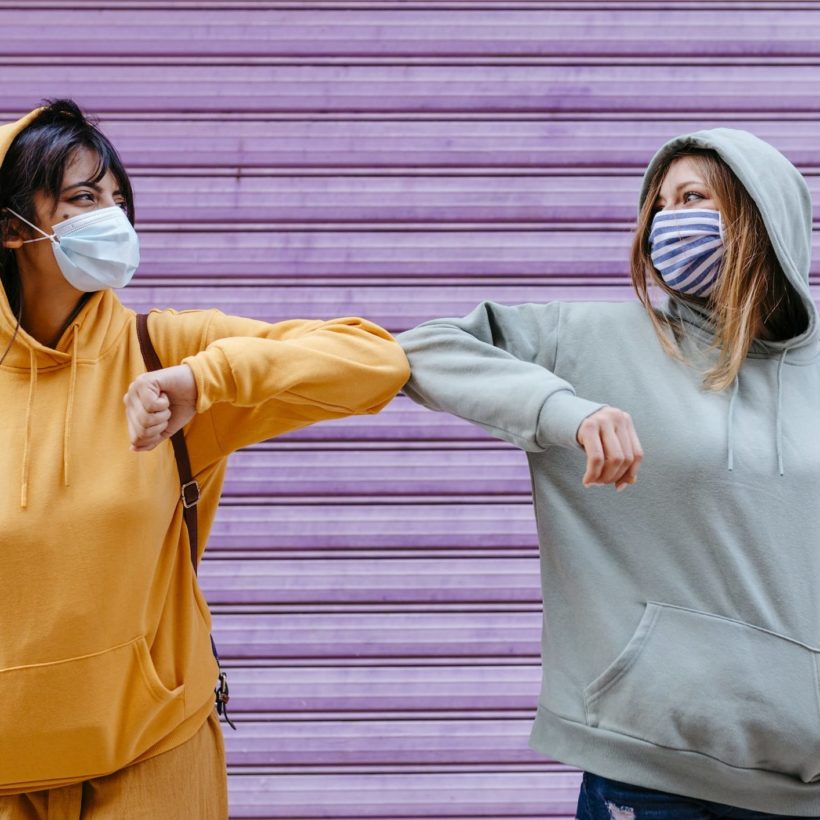If you feel a thicker smog of anxiety in the air than usual, you’re certainly not alone, as experts point out that the typical stress levels associated with managing jobs, relationships, and our everyday lives have compounded to near-crushing levels over the past few years.
“Many have experienced unprecedented levels of stress, accompanied with heightened levels of anxiety, depression, fear, and loneliness,” says Eva Ritvo, MD, a psychiatrist in Miami Beach, Florida. Ritvo points out that everyone can benefit from a little TLC right now. “That said, some friends may be suffering more than others. When someone is depressed, they often can’t express their feelings, so it’s helpful to look for warning signs.”

But how do you know when it’s progressed to something more serious, and what’s the best way to handle it once it does? From new eating habits to negative body language, read on as Dr. Ritvo helps us break down five signs a friend could be in distress and offers advice for how you can help.
Signs a friend could use your help
1. New eating habits
Most of us experience subtle changes in our diet, with some making a pivot for the better. You don’t need to ring an alarm just because you see someone eating an extra slice of pizza (or, while it may seem unusual, forgoing that usual slice in favor of a leafy salad), but Dr. Ritvo says a significant change in weight could be an indicator of something more serious. “Excess anxiety or depression can lead to undereating or overeating. Over the past few years, some may have experienced an eating disorder such as anorexia or binge eating disorder for the first time, whereas others may have relapsed due to the increased stress and changes in their routine,” she explains.
2. Changes in hygiene
With the world falling apart around them, many embraced the sliver of a benefit that was being able to wear stretch pants and perhaps even skip a shower or two while living a life of solidarity (not to mention saving on those manis and blowouts). But Dr. Ritvo cautions that consistent or more severe neglect could be cause for bigger concern. “It was harder for most of us to keep up with our grooming during quarantine, but a lack of interest in hygiene often accompanies depression and more severe anxiety,” she explains.
Some people express depression by expressing signs of sadness, while others show it with irritability.
3. Negative body language
When a friend isn’t comfortable verbalizing feelings of distress, it can also be helpful to keep an eye out for non-verbal cues. “You may notice a friend is feeling down if they don’t smile or have their shoulders slumped over. Others may have a flat expression, while some may cry or appear nervous. All of these are exterior signs of interior struggle,” cautions Dr. Ritvo.
4. Mood swings
While some may directly or indirectly cry out, others may act out. “Some people express depression by expressing signs of sadness, while others show it with irritability,” says Dr. Ritvo. “Moods that are sporadically or exponentially high, energetic, or expansive can also be symptoms of an underlying psychiatric issue like bipolar disorder.”
5. Drug and alcohol abuse
Last, but certainly not least, Dr. Ritvo points out that alcohol and drugs are often linked with other psychiatric issues and can lead to significant problems. “Be alert to a friend who seems to be over-drinking, experiencing personality issues when they are drinking or using drugs, or feeling hungover the next day. Many people decreased or stopped their drug and alcohol use during the pandemic. When returning to social situations, it can be all too easy to fall back into negative patterns,” she cautions.
What to do about it
Choose the right time
Notice a significant change in a friend or family member? Try offering to take them out to eat. “If they have a drinking or drug issue, only approach them when they are sober. If there is a food issue involved, it may be best to suggest a walk or other non-food-related activity instead. Many forms of exercise, including meditation, can also help with milder cases of anxiety and depression,” advises Dr. Ritvo.
Listen and learn

Once in a safe space, you’ll want to check in with your friend to see how they are feeling. “Sharing our emotions with others often makes us feel much better,” explains Dr. Ritvo. “Keep it friendly and open-ended, asking questions such as ‘How are you feeling?’ Make sure you are a good listener, even if it’s hard to hear what they’re sharing. Do your best to express compassion and concern, making sure to thank them for opening up to you.”
Offer resources
If the issue persists or requires greater attention (such as a verbalized or perceived disorder), make sure your friend knows they are not alone and that there are others they can talk to. “Mental health issues are quite treatable so the best way to help a friend is to make sure they get to the right place for treatment,” says Dr. Ritvo. “You can also suggest your friend talk to their family doctor about how they are feeling or take the virtual route with an online therapy resource such as Talk Therapy. If you’ve been in therapy yourself and are comfortable, consider sharing your own experience with your friend. There is a popular book called Maybe You Should Talk to Someone, which can be a great conversation starter.”
We only recommend products we have independently researched, tested, and loved. If you purchase a product found through our links, Sunday Edit may earn an affiliate commission.
If you are dealing with depression and needs help, you can call the NAMI Helpline at 800-950-NAMI.







